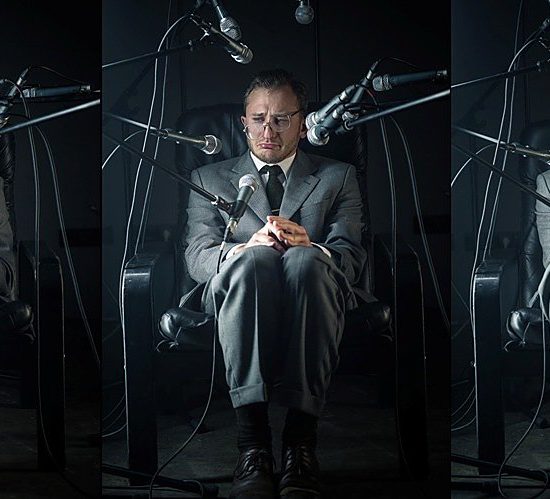A bear is dancing here
“Theater der Welt”: “Oedipus Rex” from Lithuania, staged by Oskaras Korsunovas
We’ve been waiting for 2429 years for this to happen. Our original mother, ancestors and parents had been impatiently waiting in their hope. However, they failed to see the miracle. And now, absolutely unexpectedly, it’s happened. It wasn’t a star that shone above the theatre, it wasn’t the song of Dyonisus’ angel. Not many of those who were there felt that something majestic had happened. They saw what entire generations had been dreaming of – they saw Sophocles’ “Oedipus Rex” with a fairy tale like sound recording.
The performance started gloomily. Children dressed in overalls (or rompers?) were dancing on the stage as if being operated by a remote control. With their big greyish papier-maché heads on their slender shoulders, with their eyes shut and mouths open for a munkish scream, they looked like monsters. They were all created homuncules. We’d already got frightened that a young Lithuanian director Oskaras Korsunovas was making a commentary of “Brave New World” or staging the topic of cloning as for the text itself not alien is the idea that the youth are blind to the sins of their parents and to their own destiny, as poor Oedipus slowly tracing his crime. And it seemed that this idea would be developed, but suddenly the gloom turned into merriment: the longing of 2429 years came into life.
However, before describing (carefully and with blessedness) the salto mortale of this tragedy into a comedy we should take a look at Jurate Paulekaite’s scenery. The place of the action is a playground, which would be envied by any child: lots of ladders, a swing, a seesaw, a roundabout, a sandpit, a “death-cup”. That’s the place Sophocles imagined – Thebes with its altars and the images of gods standing out in front of the king’s palace. However, it was never made this way. Not only naughty old men, who get wild while exercising, are romping here but also Oedipus and his rival Creon, childish and sweet this time, queen Jokasta and Teiresias wouldn’t like to get out of the game either. They make more improvements to it: fill the playground with smoke so that they would be able to catch each other as blind hens. And add the music: Arkadij Gotesman beats the drums, hits gongs and triangles absolutely dashingly. No one can make a single step on the stage without his beat, no one moves without his metallic clatter. The beating Gotesman frightens as a destroying spider. Compared to the beats of this musician, Wagner’s “Persiphale” march is a saraband. As children willingly dress up, grown ups also put on the costumes. If you could only see! Teiresias looks like a big beaked griffin whose body has been put into a tight silvery costume by Aleksandras Pogrebnojus and Vida Simanaviciute – Pinocchio moulded as a sausage. The members of a chorus sometimes look like Mickey Mice, sometimes like cats; they are squeaking and purring from the bottom of their hearts, they are waving the incense pots in time, however, they talk very little. The parts of the chorus Korsunovas gives to another animal – a brown bear, which is liked by everybody, which produces the nicest songs, for instance, a melodious “I’m not that murderer”. At the end, when Oedipus is facing his destiny, it becomes the beloved bear, whose murmuring is intensified by a microphone. It, of course, cannot scream so loud as the humans do: they scream when chatting as if to frighten the visitors of a horror room. It was impossible to imagine through all those 2429 years but we were secretly wishing for that.
It is known that the matter doesn’t turn into good for Oedipus and Jokasta, and for the inhabitants of Thebes it doesn’t bring any loss at its best. The director shows the decline not by the means of gesture and the carriage of a protagonist, he does not use the language means to reveal the pain and the decline. That was the mistake of all the directors during those 2429 years. These are the clothes and masks that suffer in Korsunovas’ staging. The more hopeless is state of the soul, the shaggier are the clothes. Finally, the mischievous chorus mice’s ears are gnawed, the embracing bear loses its left leg and its fur is burnt. Even the earlier splendour of Jokasta and Oedipus fades away: her dress becomes a rag, he doesn’t have his wonderful suit anymore. The jacket tears off into a short cloth. Shaggy shorts replace the trousers.
[…]
C. BERND SUCHER



